17+ Best Ecommerce Platforms Reviewed and Compared (2021)

Last Updated on December 17, 2020 by Adam Enfroy
Ecommerce is quietly and conveniently taking over our lives. According to Jeff Bezos, Amazon has over 100 million Amazon Prime members. Free shipping is the norm. Two-day shipping is becoming one-day or two-hour shipping.
If you want to start your ecommerce store, choosing the best ecommerce platforms can be tough – there are over 477 different options.
I want to make this decision easier by showcasing the best ecommerce software so you can find the right solution for your online store. Let’s face it – with so many options on the market, there will only be a few left standing in the end, so you want to make sure you pick the winner.
Why should you trust these reviews?
I have over 10 years of ecommerce experience:
- I’ve managed marketing teams for ecommerce brands making over $100 million/year.
- In a previous role, I was in warehouses and managed wholesale shipments.
- I’ve managed 8-figure/year ecommerce marketing budgets.
- I’ve worked for SaaS companies in the ecommerce space.
- And I’ve launched online stores on almost every platform.
These reviews rank based on price, reliability, technical support, features, scalability, product options, shipping, fulfillment, control panel experience, and more.
We’ll also compare and review things like:
- The best choices for small businesses.
- The top cheap, free, and open-source options.
- The platforms with the best themes and website designs.
- Enterprise solutions for large brands.
Let’s get started.
Disclaimer: I receive affiliate compensation for some of the links below at no cost to you. However, these are the best tools I have used and tested that I believe are most effective for launching and running an online store. You can read our full affiliate disclosure in our privacy policy.
What Are the Best Ecommerce Platforms?
Ecommerce platforms are robust, full-featured software tools to sell products online. When choosing from the best options, there are many considerations, and each ecommerce website builder provides different features.
For example, your needs will be different if you’re selling three products vs. 100. Or if you want to do dropshipping rather than your own shipping and fulfillment.
Ultimately, ecommerce software should let you add your products quickly, offer coupons and discounts, and automatically track inventory. They should also help manage shipping and fulfillment so that you can focus on running your business.
Here are my picks for the best ecommerce platforms to try this year:
1. Wix.
Best Ecommerce Platform for Small Business ($23/month).
Wix is a fast-growing website builder that allows users to upgrade to full ecommerce functionality for $20 per month. They boast hundreds of designer-made templates, promotions and gift cards, beautiful product galleries, and easy order management and shipping.
They automatically optimize your online store on mobile, including iPhones and Android devices (Apple and Google). You can also customize the look of your mobile ecommerce site with their online store builder tool. You don’t need to dive into HTML or CSS to create a stunning website with Wix.
They have an excellent array of product galleries to layout your products in a beautiful (and conversion-optimized) way.
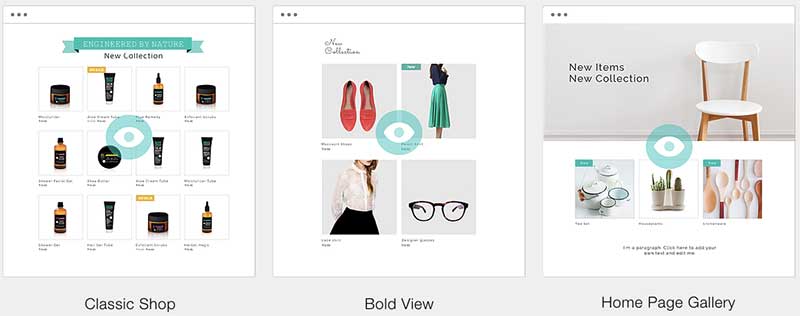
These product galleries layout great on mobile devices too and adapt in a stacked format.
Wix is also known as one of the easiest tools to use in both the website builder and ecommerce space.
There are literally only seven steps needed to build your online store:
- Log in to your account or sign up for free.
- Pick a template from the Online Store category.
- Edit the text and add your business name.
- Click “My Store” & “Manage Your Store”.
- Add products to your store.
- Select “Business Setup” to add Payments, Shipping & Store Settings.
- Publish your site & connect to your own domain.
Finally, Wix offers a secure checkout, 24/7 customer support, multiple payment options and solutions, global tax and shipping, and coupons, and discounts to help you sell more.
Try Wix for free and start selling your products online.
2. BigCommerce.
Best Ecommerce Platform for Large Businesses Built to Scale ($29.95/mo).
BigCommerce is my #2 ecommerce platform recommendation. They have best-in-class SEO features, 40+ payment gateways, advanced product options, 24/7 support, and can scale with your ecommerce business up to over $100 million per year.
Here’s what typically happens.
A small business owner decides to get into ecommerce and chooses a platform like Shopify because of their name recognition. After 6-12 months, they start growing sales and paying extra for apps and add-ons to help their ecommerce business grow.
After some time, they hit a growth ceiling. These users may realize they are paying hundreds of dollars every month for apps, their SEO is lacking, or they’re outgrowing their platform.
Enter BigCommerce:
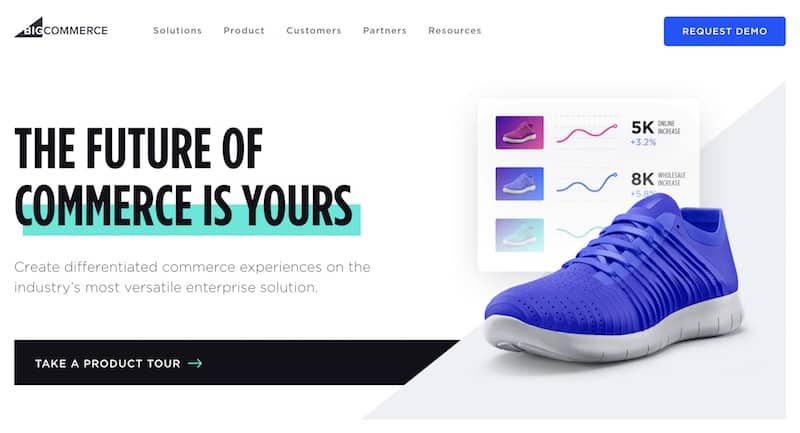
They are the most open SaaS ecommerce platform on the market – open APIs, zero transaction fees, and an open partner ecosystem.
BigCommerce has two product offerings: BigCommerce (their enterprise offering) and BigCommerce Essentials (built for small businesses). Both are built to scale with your growth.
On the one hand, they are an accessible platform for small business owners because of their features and built-in functionality. However, there is a slightly higher learning curve than an easier tool like Wix.
They’re also perfect for enterprise brands looking to leave expensive on-premise solutions like Magento and move to software as a service (SaaS). Brands like Ford, Toyota, Skullcandy, and others in the Fortune 1000 use BigCommerce and can easily bring in over $100 million in annual sales without hiccups.
In December 2018, they launched BigCommerce for WordPress, a “headless commerce” product, allowing users to manage their front end content on WordPress and their backend ecommerce with BigCommerce.
This use of APIs allows for faster WordPress site speed than you find with other WordPress ecommerce options like WooCommerce, which installs multiple plugins to work and hinders performance.
Their plans start at $29.95/month, and with that, you get a branded online store and domain name with the ability to sell on Amazon, eBay, and social media like Facebook, Instagram, and Pinterest.
They have a simple user interface to build your online store, including sections for your orders, products, marketing, analytics, taxes, and your storefront:
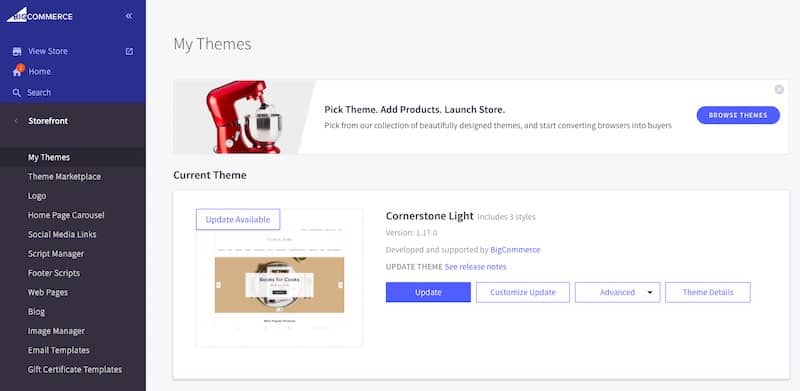
With the newly launched BigCommerce Shipping features, you get discounted carrier rates and gain the ability to print shipping labels and manage fulfillment right in your dashboard.
Their themes are fully responsive and optimized with conversion rates in mind. They also offer free SSL certificates, have a clear pricing structure, and again – zero transaction fees.
BigCommerce receives my highest recommendation for medium to large businesses and you can get started with a 15-day free trial.
3. Shopify.
Great Ecommerce Software for Dropshipping ($29/month).
Shopify is an ecommerce powerhouse, hosting over 400,000 merchants worldwide. When you think of ecommerce, your mind might go right to Shopify. They’re a Canadian company that launched in 2004 and quickly became one of the fastest-growing SaaS companies in North America.
Dissatisfied by existing mobile apps and ecommerce products on the market, Tobias Lütke, Daniel Weinand, and Scott Lake built their open-source web application with Ruby on Rails and launched after two months.
That program became Shopify.
One reason Shopify gained massive brand awareness was by appealing to the audience of “dreamers” – new users who want to strike it rich in ecommerce.
With their integrations, even the most inexperienced users can set up a dropshipping store with relative ease. I tested it out. After picking my inventory, I integrated a few dropshipping suppliers with Shopify and test-launched a store.
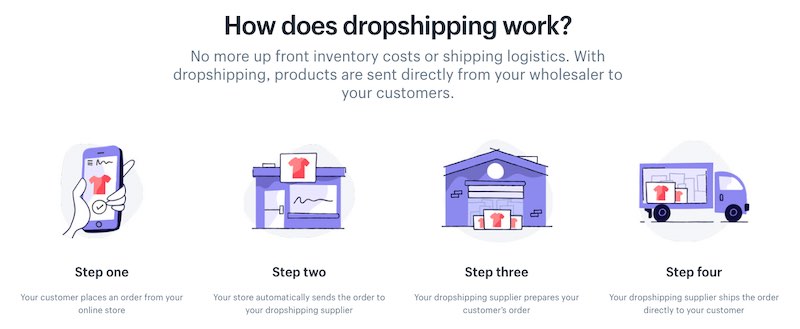
It was easy to design a cool-looking website and add products. But just because you have an online store doesn’t mean it is a successful one – you need to market your business.
A few drawbacks to Shopify are their SEO rules. Your URL structure locks into their format. For example, instead of category pages located at campingsite.com/tents, Shopify forces you to use their format of campingsite.com/collections/tents. This structure is not ideal for search rankings, especially considering “category” is a higher-level subfolder than the more critical keyword “tents.”
Second, they have fewer product options than BigCommerce. If you are selling t-shirts, for example, and have different colors, materials, and sizes, your SKUs add up quickly. Shopify is limited to only 100 product variants – not enough if you have a lot of different product combinations.
Limitations aside, Shopify is a reliable ecommerce platform that works well for small businesses.
Shopify has three plans ranging from $29 to $299. Additionally, its enterprise Shopify Plus platform offers its own custom pricing.
All plans include unlimited products, free SSL, discount codes, inventory management, multilingual support, easy buy buttons, abandoned cart recovery, marketing features, and 24/7 support.
To test them out for yourself, they offer a 14-day free trial.
You can also read my full Shopify review or my articles with comparisons of BigCommerce vs. Shopify and Wix vs. Shopify.
4. Square Online.
Best For Retailers and Local Businesses Looking to Move Online (Free – $72/month)
Square, the popular POS system, launched Square Online as an ecommerce offering to help retailers move their businesses online.
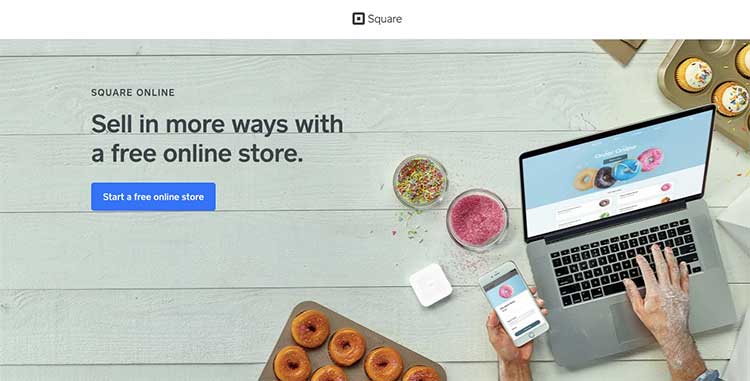
It’s a strong standalone ecommerce platform but also adds great options for local businesses, like curbside pickup and local delivery.
Here’s how you can get started with Square Online:
- Create your website using their pre-made templates, add pages with page editors, and add your store details.
- Add products to your store.
- Launch your store for free (only pay 2.9% + $0.30 per transaction). Or you can move to a paid plan for more advanced features.
It’s a very easy setup and a flexible option made for small businesses looking to quickly and easily move online.
You can sell directly from your Instagram feed and then expand to a full ecommerce website when you’re ready.
Another strong feature is their secure online payments and ability for customers to pay via Apple Pay and Google Pay.
Square Online also has a number of unique features for small business websites:
- Online food ordering for restaurant websites.
- Tools for online and in-person retail.
- Online bookings through Square appointments.
- The ability to accept donations for nonprofit websites.
Square Online Pricing
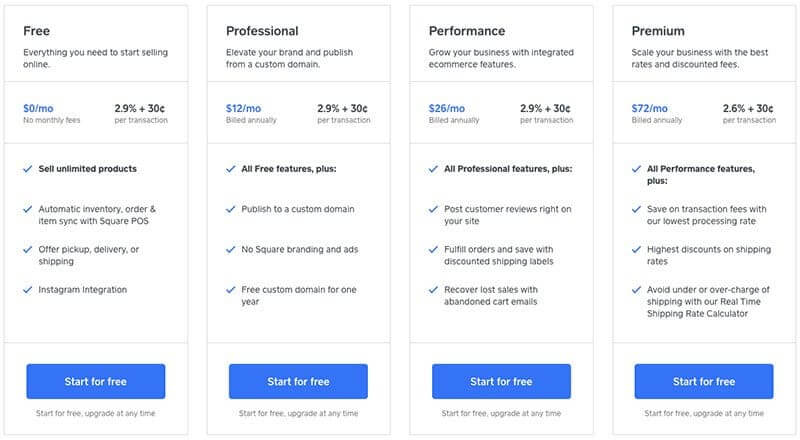
Square Online has a completely free plan, which includes unlimited products, in-house and on-demand delivery, gift cards and coupons, SEO tools, an SSL certificate, integration with Instagram, inventory sync with Square POS, and more.
You only pay the 2.9% + $0.30 transaction fee and $0.50 per delivery. One drawback of this plan is that you don’t get to use your own domain name.
If you’d like to upgrade to one of their paid plans, you get extra features:
- Professional ($12/month): Custom domain name (free for one year) and no Square branding.
- Performance ($26/month): Adds abandoned cart emails, on-site customer reviews, and discounted shipping labels.
- Premium ($72/month): Lower transaction fees, highest shipping discounts, and a real-time shipping rate calculator.
This is nice because you can scale your plan as your online business grows. If you’re just starting to sell online, I recommend you get started with their Professional Plan and then scale up to the higher-tier plans as your orders increase.
Overall, Square Online is a great choice if you’re a traditional retailer or local business looking to move online.
5. Zyro.
New Ecommerce Platform Best for Multi-Channel Sales ($14.99/month).
Zyro is a popular website builder that just released its long-awaited Zyro ecommerce platform.
Launched in early 2020, their new online store builder takes all of the great features they’ve developed over the years as a website builder and adds a full suite of ecommerce features.
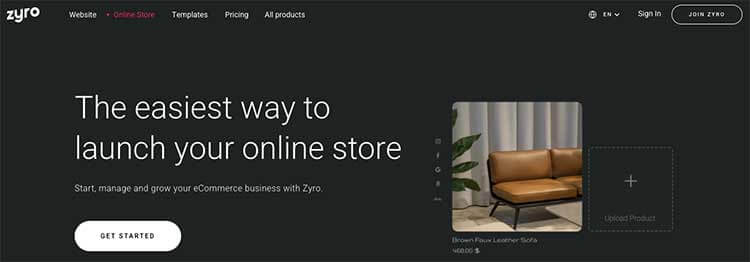
This platform excels in a few key areas. First, they provide their merchants the ability to sell products across multiple channels, including Amazon, Facebook, and Instagram.
Second, it’s simple to use. Much like Shopify, they say that you can start selling in under an hour. And it’s true. With their drag and drop website capabilities and quick set up guide, it’s an easy code-free process.
Zyro provides everything you need to run an online store, including:
- Order and inventory management
- 50+ payment options and commission-free sales
- Shipping and tax management
- Discount codes and gift cards
- Email messages and notifications
- Multiple storefronts: online store, plus Amazon, Facebook, and Instagram
- Free hosting
There are a few small drawbacks though.
Since they are such a new platform, advanced features are still being developed and may be absent. Zyro currently has 68 ecommerce themes to choose from. I also spoke with their team and they promise to have over 150 new themes soon. Not bad for a new platform!
One important note is that any Zyro template can be used for an online store – you just have to go to their elements section in the editor and “add e-shop functionality.”
Let’s move onto pricing.
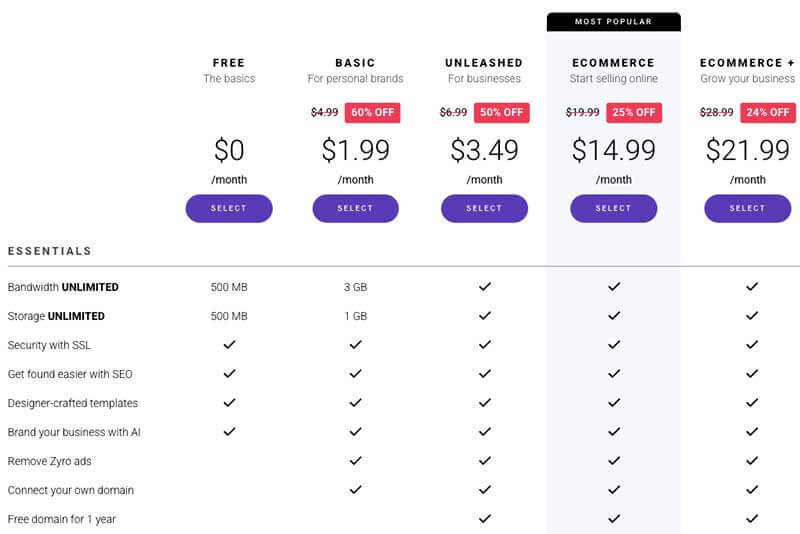
In addition to their free plan, Zyro added two new ecommerce plans: Ecommerce (most popular) and Ecommerce +.
- Their Ecommerce plan is $14.99/month (or $8.99/month for a 3-year term).
- The Ecommerce + plan is $21.99/month (or $10.99/month for a 3-year term). This plan adds features like abandoned cart recovery, multi-channel sales, and multi-lingual stores.
Overall, if you want a simple-to-use, multi-channel ecommerce platform, give Zyro a try. You can start with a free plan to test out its website features, then upgrade to an ecommerce plan when you’re ready.
6. Ecwid.
Best Online Store Builder For Existing Websites ($35/month).

With a customer base of 1.6 million small businesses, Ecwid is an excellent and one of the most popular ecommerce platforms available. It also got awarded the “fastest ecommerce implementation platform” by G2 Crowd.
It’s most suitable if you already have a website and want to add a new store or shopping capabilities to it. The good news is that the platform is simple and straightforward to use.
Moreover, it’s entirely flexible and enables users to sell on numerous sites like:
- Amazon
- eBay

This helps you reach out to a massive number of buyers across the world on different platforms from one dashboard.
Starting with Ecwid is also decidedly easy. And if you run your website on platforms like Joomla, Drupal, or WordPress Business, then things become even easier for you because of Ecwid’s in-built integration with them.
Furthermore, it has a highly customizable storefront, which ensures maximum visibility for your products – no matter which device the customer is using. You can prominently display brand elements like logos, colors, and messages to attract your target audience.
Ecwid also allows you to create, manage, and track all of your advertisements right from the dashboard itself. Curating the perfect Facebook advertisements or Google advertisements is also easy.
The payment process is straightforward, courtesy of Ecwid’s seamless integration with over 50 payment gateways like First Data, PayPal, Square, Stripe, WePay, and more via an in-built functionality with top POS systems.
Additionally, Ecwid is a ‘PCI DSS validated Level 1 Service Provider,’ which helps it ensure end-to-end data encryption and secure customer and merchant payment details.
Some of Ecwid’s other unique capabilities are:
- Inventory tracking
- Saving favorite products
- A comprehensive customer address book
- Managing product options
- Automatic updates
- Smart shipping calculations
- An easy checkout process
All these features (among others) help Ecwid stand out from its counterparts. That said, it has its limitations as well. Firstly, it doesn’t offer services in languages other than English. They also don’t provide any telephone support.
However, the feature-rich and diverse pricing plans make up for the limitations. The good news is that Ecwid comes with a free plan that provides all the necessary functions and lets you sell ten physical items in a month
No comments: